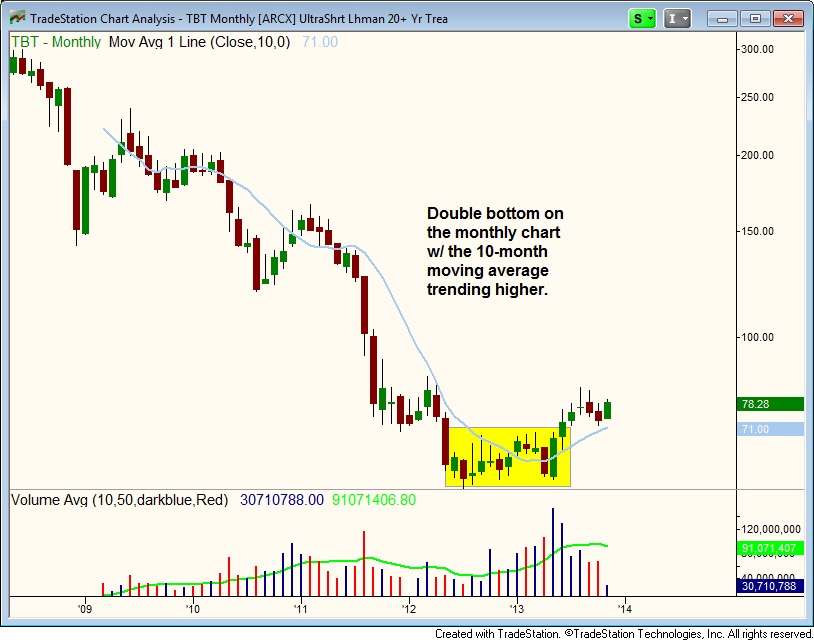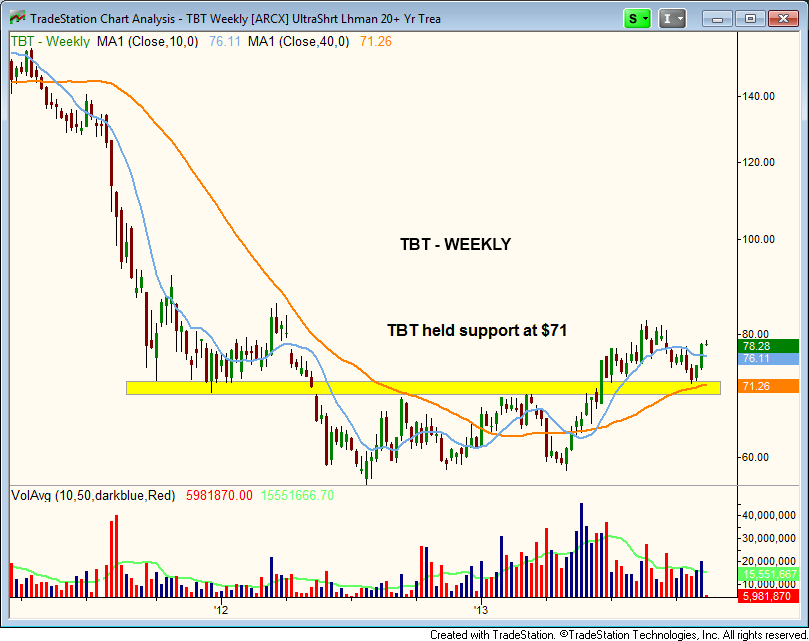| The Wagner Daily ETF Report For November 13 |
| By Deron Wagner |
Published
11/13/2013
|
Stocks
|
Unrated
|
|
|
|
The Wagner Daily ETF Report For November 13
Since our market timing model shifted out of "Buy" mode on November 7, we have been focused on trading ETFs with a low correlation to the direction of the stock market, rather than individual leading stocks.
Two days ago, we detailed 2 potential ETF trade setups with low to no correlation to overall stock market direction: ProShares UltraShort Yen - $YCS (a currency ETF) and Physical Palladium Shares - $PALL (a commodity ETF).
Today, we enter the world of fixed-income (bond) ETFs with a potential intermediate-term trade setup into ProShares UltraShort 20+ Year T-bond ($TBT).
Higher Interest Rates = Lower Bond Prices = A Tradeable Inverse Bond ETF
$TBT is a leveraged, inversely correlated ETF designed to move in the opposite direction (and double the percentage) of iShares 20+Year T-bond ($TLT).
As interest rates rise, the corresponding prices of the bonds decline (and vice versa).
If $TBT (which moves in the opposite direction of long-term bond prices) is poised to head higher, it means long bond prices are primed to move lower.
In turn, this means long-term interest rates may soon be headed higher.
Get it? Got it? Good!
Long-Term Bottoms
Have long-term interest rates bottomed out? The "big picture" monthly and weekly charts of $TBT below suggest so.
Starting with the monthly chart, the double bottom pattern and subsequent, big-volume rally in May and June are two valid technical signs that a significant bottom has formed

Additionally, the 10-month moving average is also now sloping higher, and $TBT has been forming a bullish, tight-ranged consolidation over the past few months.
Drilling down to the shorter-term weekly chart pattern of $TBT, notice the major band of horizontal price support around the $71 area (highlighted in yellow).
The 40-week moving average (roughly same as 200-day moving average) also converges near that same area of price support.
The 10-week moving average (blue line) is well above the 40-week moving average (orange line), which is now above resistance of the prior highs from January through March of this year.
However, the 10-week moving average has recently turned lower, which suggests $TBT may need a few more weeks of sideways consolidation before resuming its uptrend:

Patience Over Action
Most important to note about this potential ETF trade setup is that $TBT is not actionable right now.
Nevertheless, now is the time to be building a new "watchlist" of select ETF trades to consider buying (or selling short) while our market bias hangs back in neutral mode.
In weakening or indecisive markets, the most profitable swing traders sit around and wait (in cash) for the great trade entries to literally fall into their laps, rather than chase them with reckless abandon.
As always, we will continue to monitor the price of $TBT for a low-risk buy entry point (such as a pullback to the 10-week moving average), and will be sure to alert subscribers of our ETF and stock picking newsletter if/when $TBT meets our rule-based criteria for buy entry.
Deron Wagner is the Founder and Head Trader of both Morpheus Capital LP, a U.S. hedge fund, and MorpheusTrading.com, a trader education firm.
|